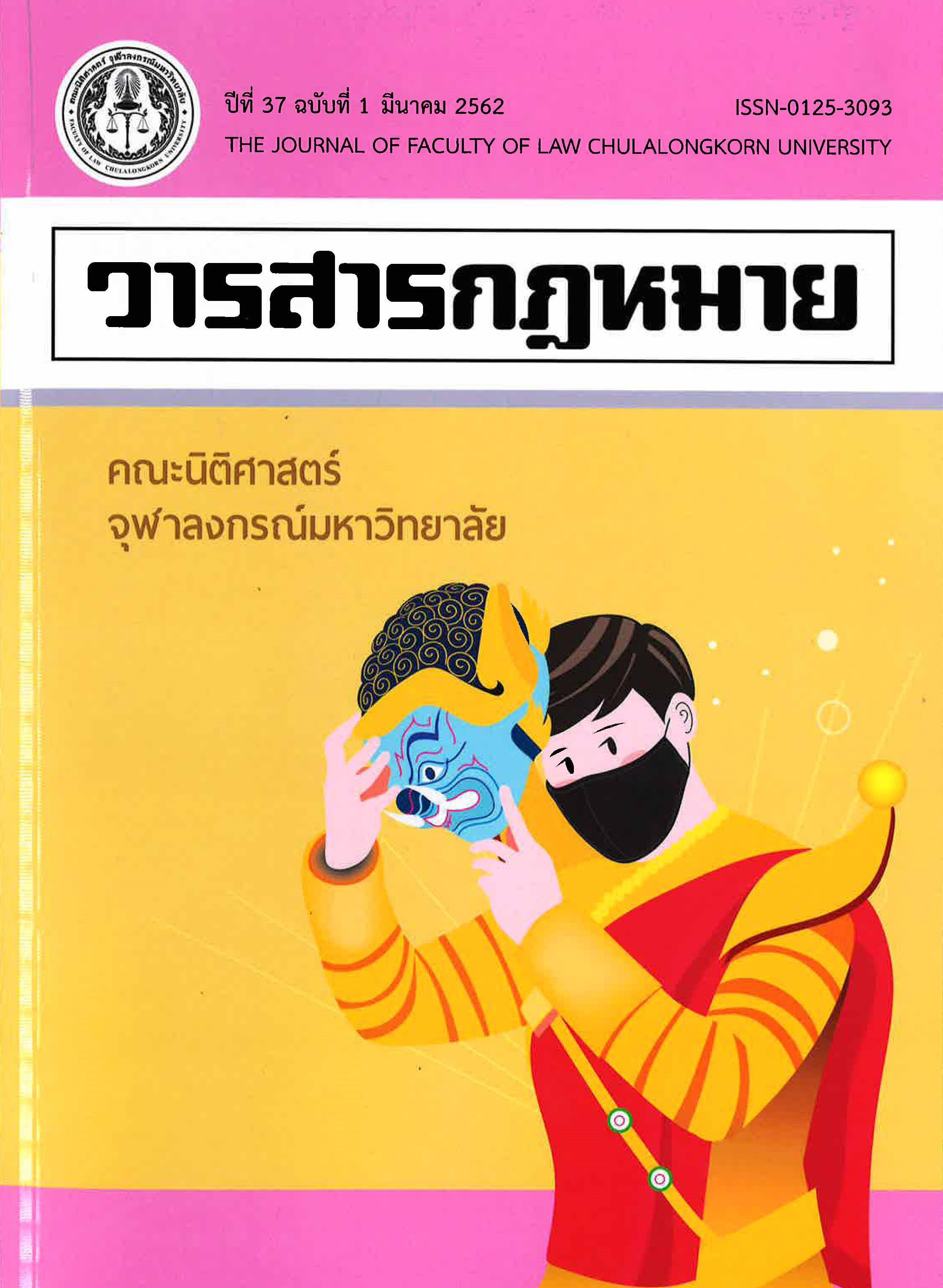สถานการณ์และปัญหาของธุรกิจร้านอาหารไทยที่เป็นอุปสรรคต่อการลงทุนทางตรงในต่างประเทศ: ศึกษาการลงทุนทางตรงของธุรกิจศึกษาธุรกิจร้านอาหารไทยในสหรัฐอเมริกา
Main Article Content
บทคัดย่อ
อาหารไทยมีชื่อเสียงเป็นที่รู้จักระดับโลก ด้วยความโดดเด่นในด้านของรสชาติ ความประณีตบรรจง หนึ่งในประเทศที่มีความน่าสนใจในการไปลงทุนทางตรงโดยการเปิดร้านอาหารไทยได้แก่ สหรัฐอเมริกา เนื่องจากชาวอเมริกันส่วนใหญ่มองว่าอาหารไทยเป็นอาหารที่มีรสชาติดีมีระดับ ไม่ใช่อาหารฟาสฟู้ดหรืออาหารจานด่วนราคาถูก ร้านอาหารไทยจำนวนมากในอเมริกาจึงเติบโตสามารถทำกำไรได้ไม่น้อย อย่างไรก็ดีถึงแม้ว่าสหรัฐอเมริกาจะเป็นตลาดที่น่าสนใจสำหรับธุรกิจร้านอาหารไทยแต่ก็ยังมีอุปสรรคต่อการลงทุนทางตรงต่อผู้ประกอบการไทยหลายประการ เช่น ปัญหาการขาดผู้ประสานงานระหว่างผู้ลงทุนกับหน่วยงานของรัฐท้องถิ่น ปัญหาด้านเงินทุน ปัญหาด้านแรงงาน ปัญหาเกี่ยวกับใบอนุญาตที่เกี่ยวกับธุรกิจร้านอาหาร ปัญหาเกี่ยวกับนโยบายทางการเมือง “ซื้อของอเมริกัน-จ้างคนอเมริกัน” ปัญหาเรื่องวัตถุดิบที่ใช้ประกอบอาหาร ปัญหาด้านภาพลักษณ์ความเป็นไทยและการประชาสัมพันธ์ อีกประการหนึ่งที่สำคัญคือเนื่องจากร้านอาหารไทยในต่างประเทศควรเป็นสื่อบริการอาหารรสชาติไทยแท้ และแสดงวัฒนธรรมทางอาหารของไทยที่ถูกต้อง ซึ่งจำเป็นต้องดำเนินการโดยคนไทยและพ่อครัวแม่ครัวไทย กรณีที่เจ้าของร้านไม่ใช่คนไทยจำหน่ายอาหารไทยปะปนกับอาหารชาติอื่น ย่อมส่งผลให้ผู้บริโภคเกิดความสับสนในเรื่องของรสชาติอาหารไทย ดังนี้หนึ่งในปัญหาสำคัญของการประกอบกิจการร้านอาหารไทยในต่างประเทศ รวมถึงสหรัฐอเมริกาคือการขาดทรัพยากรบุคคลในการดำเนินธุรกิจร้านอาหารไทย โดยเฉพาะพ่อครัวและแม่ครัวอาหารไทยที่มีประสบการณ์ ซึ่งเป็นผลมาจากข้อจำกัดที่เกี่ยวข้องกับกระบวนการขออนุญาตในการเดินทางไปทำงานต่างประเทศ เช่น การขอใบอนุญาตเข้าประเทศ (Visa) และใบอนุญาตทำงาน (Work Permit) เป็นไปด้วยความยากลำบากซึ่งเป็นอุปสรรคที่สำคัญต่อการดำเนินธุรกิจร้านอาหารไทยในสหรัฐอเมริกาจากโอกาสและอุปสรรคที่กล่าวมาข้างต้นนั้นจึงเห็นได้ว่าผู้ประกอบการร้านอาหารได้ในต่างประเทศ โดยฉพาะที่เป็นวิสาหกิจขนาดกลางและขนาดย่อมควรได้รับการช่วยเหลือสนับสนุนโดยใช้เครื่องมือทางกฎหมาย มาตรการ และหน่วยงานของรัฐที่เกี่ยวข้อง ทั้งนี้การสนับสนุน การสร้างความเข็มแข็งและการพัฒนาตลาดอาหารจำเป็นต้องทำอย่างครบวงจร ตั้งแต่ต้นน้ำหรือเริ่มการผลิตได้แก่การพัฒนาคุณภาพปัจจัยการผลิตและโครงสร้างพื้นฐานสำหรับการผลิตอาหารไทย จนถึงปลายน้ำได้แก่การสนับสนุนการประกอบธุรกิจร้านอาหารไทยทั้งในประเทศและต่างประเทศ
Article Details
ลิขสิทธิ์และเนื้อหาในเว็บไซต์ของวารสารกฎหมาย (รวมถึง โดยไม่จำกัดเฉพาะ เนื้อหา รหัสคอมพิวเตอร์ งานศิลป์ ภาพถ่าย รูปภาพ ดนตรีกรรม โสตทัศนวัสดุ) เป็นกรรมสิทธิ์ของวารสารกฎหมาย และผู้ได้รับการโอนสิทธิทุกราย
1. วารสารกฎหมาย ให้อนุญาตให้คุณใช้สิทธิอันไม่เฉพาะเจาะจงที่สามารถถูกถอนเมื่อใดก็ได้ โดยไม่มีค่าใช้จ่าย ในการ
- เยี่ยมชมเว็บไซต์และเอกสารในเว็บไซต์นี้ จากคอมพิวเตอร์หรือเครื่องมือสื่อสารผ่านเว็บบราวเซอร์
- คัดลอกและจัดเก็บเว็บไซต์และเอกสารในเว็บไซต์นี้บนลงคอมพิวเตอร์ของคุณผ่านระบบความจำ cache
- สั่งพิมพ์เอกสารจากเว็บไซต์นี้สำหรับการใช้ส่วนตัวของคุณ
- ผลงานที่ได้รับการตีพิมพ์โดยวารสารกฎหมาย จุฬาลงกรณ์มหาวิทยาลัย ถูกคุ้มครองภายใต้ Creative Commons Attribution 4.0 International License ซึ่งอนุญาตให้ทุกคนสามารถคัดลอก แจกจ่าย ดัดแปลง ส่งต่อ ผลงานได้ ก็ต่อเมื่อผลงานและแหล่งข้อมูลได้รับการอ้างอิงอย่างเหมาะสม
2. วารสารกฎหมาย จุฬาลงกรณ์มหาวิทยาลัย สงวนสิทธิ์ไม่อนุญาตให้คุณใช้สิทธิอื่นใดที่เกี่ยวข้องกับเว็บไซต์และเอกสารบนเว็บไซต์นี้ เช่น การคัดลอก ดัดแปลง เปลี่ยนแปลง ส่งต่อ ตีพิมพ์ แจกจ่าย เผยแพร่ จัดแสดงในที่สาธารณะ ไม่ว่าจะในรูปแบบใดก็ตาม ซึ่งเว็บไซต์หรือเอกสารบนเว็บไซต์ โดยไม่อ้างอิงถึงแหล่งข้อมูลหรือโดยไม่ได้รับอนุญาตเป็นลายลักษณ์อักษรจากวารสารกฎหมาย จุฬาลงกรณ์มหาวิทยาลัย
3. คุณอาจขออนุญาตที่จะใช้เอกสารอันมีลิขสิทธิ์บนเว็บไซต์นี้โดยการเขียนอีเมลล์มายัง journal@law.chula.ac.th
4. วารสารกฎหมาย จุฬาลงกรณ์มหาวิทยาลัย เข้มงวดกับการคุ้มครองลิขสิทธิ์อย่างมาก หากวารสารกฎหมาย จุฬาลงกรณ์มหาวิทยาลัยพบว่าคุณได้ใช้เอกสารอันมีลิขสิทธิ์บนเว็บไซต์นี้โดยไม่ถูกต้องตามการอนุญาตให้ใช้สิทธิ ดังที่กล่าวไปข้างต้น วารสารกฎหมาย จุฬาลงกรณ์มหาวิทยาลัยอาจดำเนินคดีตามกฎหมายต่อคุณได้ เพื่อเรียกร้องค่าเสียหายที่เป็นตัวเงินและคำขอชั่วคราวให้คุณหยุดการใช้เอกสารดังกล่าว ทั้งนี้ คุณอาจถูกสั่งให้ชดใช้ค่าใช้จ่ายใดๆ ที่เกี่ยวข้องกับการดำเนินการตามกฎหมายนี้
หากคุณพบเห็นการใช้เอกสารอันมีลิขสิทธิ์ของวารสารกฎหมาย จุฬาลงกรณ์มหาวิทยาลัย ที่ขัดหรืออาจขัดต่อการอนุญาตให้ใช้สิทธิดังที่ได้กล่าวไปข้างต้น โดยเชื่อว่าได้ละเมิดลิขสิทธิ์ของคุณหรือของผู้อื่น สามารถร้องเรียนมาได้ที่ journal@law.chula.ac.th


